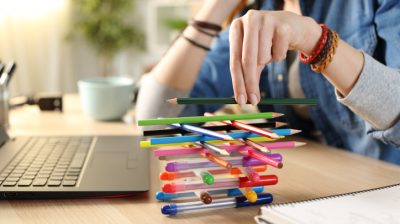Habits to help you study effectively
What you do before, during and after your study sessions is important.

When it comes to studying, the goal is not to spend a certain amount of time at your desk each day. The goal is to retain information. Your daily habits can impact your ability to focus and retain information, so it is important to be mindful of them.
Habits for effective study
If you are finding it difficult to concentrate or remember what you study, making some tweaks to your daily habits can make a difference.
Stick to a plan
When you are preparing for exams, the amount of information you need to study can seem daunting. It is a good idea to have goals or targets to know where you are heading. However, if you are only focusing on the overall goal (for example, studying the entire biology curriculum), it can be very overwhelming. This is why it is also important to focus on the systems or the steps that can help you to get there.
Before starting to study, it is a good idea to write out what you want to achieve (goals) and how much time you have to reach them (timelines). Once you do this, you can begin to figure out the daily and ongoing steps that will help you to get there. Break each subject down into smaller, specific chunks and create a study timetable that you can refer to each day. Remember, not everything on your course will be examinable, and certain sections are worth more marks than others. A general awareness of the exam structure and marking scheme will help you to break the subjects down further.
Make sure that the time you’re setting aside will be enough to cover the topic you want to look at. This might be difficult to predict so, if you need to adjust the timetable at a later date, that is completely fine. It can help to set some time aside at the beginning of each day to revise how the previous day went.
Try to stick to the plan that you create. Of course, sometimes unexpected things arise that interrupt our schedules. If that happens, try not to beat yourself up about it, just pick up where you left off.
Keep a study journal
It can be helpful to journal at the end of a study session. In your entry, you can note down what your initial goal was, what you managed to get done and what your next action step is when you visit the subject again. When you go to study the subject again, this action step will tell you what you have to do next and also, remind you what you studied last time. This will help you to link information together.
Take breaks
It is very important to include breaks in your timetable and in your week. It is also a good idea to decide on a set time that you will finish studying each evening. When you have scheduled a break, make sure that you truly distance yourself from your work. It is important to have boundaries between when you are studying and when you are resting.
Optimise your study space
The environment that you study in has an impact on your ability to focus and remember information. It is a good idea to take some time to set up the space that you are in. If possible, try to find a space that you do not use for anything else rather than studying in the kitchen or bedroom.
An ideal study environment is one that is free from distractions. With this in mind, try to keep your study space free from clutter that might affect your focus. It is also a good idea to minimise any distraction from noise in the space. Some people like to listen to music while they study. If this is true for you, it is best to choose classical music or, if listening to music with lyrics, songs that you are already familiar with.
If you have to share a study space with a family member or housemate who is also working from home, that isn’t always easy. It could be helpful to have a discussion with them about the best way to work around each other. Find out more about setting up a study space at home.
Phones can be very distracting while you are trying to study. It is a good idea to turn your phone off, put it on flight mode or use an app that blocks social media platforms during your study sessions.
Reward yourself
Offering yourself small rewards can help you to stick to your study plan and prevent procrastination. Telling yourself you can have a small reward if you finish studying a section can help you to stay motivated. This can be something as simple as having a walk, getting a hot drink from your favourite cafe, watching your favourite series or doing a short guided meditation. Shifting your focus like this helps you to retain the information and can motivate you to study again.
Keep hydrated
Keep a bottle of water close to you while you’re studying. Even slight dehydration can lead to a lack of focus and concentration, so it’s important to drink enough water when you’re studying. Try to drink consistently throughout the day instead of waiting until you feel thirsty to do so. Drinking 200ml of water an hour is the optimal amount for focus.
When you can, try to choose water over energy drinks or coffee. While the caffeine in these drinks can temporarily improve your focus and alertness, too much caffeine might make you jittery. If taken later in the day, it might also affect your sleep.
Eat nutritious and regular meals
A nutritious diet can enhance cognitive skills like concentration and memory. For this reason, investing time in planning and preparing nutritious meals and snacks is very worthwhile at exam time.
There is no one food or food group that will make it easier to study. It is a good idea to eat a variety of foods to ensure you are getting all of the nutrients your brain and body need.
It is also good to space your meals throughout the day to ensure you have a consistent supply of energy. If you have a busy schedule, it can be tempting to skip meals, but this can have negative effects on your study. On busy days, focus on quick snacks and nutritious but easy to prepare meals.
Find out more about eating well during exam time.
Get enough sleep
Sleep is essential for enhancing both learning and memory. If you do not get enough sleep, you will not be able to focus your attention optimally and will find it very difficult to learn new things. Sleep also has a role in the consolidation of memory, meaning that it will help you to retain any new information that you learned during the day.
It is recommended that you get between seven to nine hours of sleep each night, but you could need more depending on your specific needs. In order to achieve this, it is a good idea to decide on a bedtime for each night. Setting a bedtime alarm is a simple but effective way to ensure you stick to your chosen time.
Move your body every day
Physical exercise can help you to improve your memory, increase cognitive performance and improve your concentration. It can also help you to reduce stress or anxiety, which are things that many people experience during exam time. If you want to get the most out of your study sessions, it is a good idea to include any form of movement in your daily routine.
Coping with exam stress
If you are feeling really overwhelmed and the exam stress is becoming too much for you, make sure you talk to someone.
This could be a teacher, a friend, a parent, a lecturer, or someone from your Students’ Union if you’re in college. You can also contact our free, 24/7 text support service 50808:
Feeling overwhelmed and want to talk to someone?
- Get anonymous support 24/7 with our text message support service
- Connect with a trained volunteer who will listen to you, and help you to move forward feeling better
- Whatsapp us now or free-text SPUNOUT to 50808 to begin.
- Find out more about our text message support service
If you are a customer of the 48 or An Post network or cannot get through using the ‘50808’ short code please text HELLO to 086 1800 280 (standard message rates may apply). Some smaller networks do not support short codes like ‘50808’.
Need more information, advice or guidance?
We offer information, advice and guidance about the issues that matter to you. Our online Youth Information Chat service is for 16 to 25 year olds and is available Monday to Friday, 4pm to 8pm (excluding Bank Holidays).





